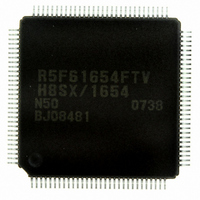DF61654N50FTV Renesas Electronics America, DF61654N50FTV Datasheet - Page 593

DF61654N50FTV
Manufacturer Part Number
DF61654N50FTV
Description
IC H8SX/1654 MCU FLASH 120TQFP
Manufacturer
Renesas Electronics America
Series
H8® H8SX/1600r
Datasheet
1.DF61653N50FTV.pdf
(1020 pages)
Specifications of DF61654N50FTV
Core Processor
H8SX
Core Size
32-Bit
Speed
50MHz
Connectivity
I²C, IrDA, SCI, SmartCard, USB
Peripherals
DMA, PWM, WDT
Number Of I /o
75
Program Memory Size
512KB (512K x 8)
Program Memory Type
FLASH
Ram Size
40K x 8
Voltage - Supply (vcc/vdd)
3 V ~ 3.6 V
Data Converters
A/D 8x10b; D/A 2x8b
Oscillator Type
External
Operating Temperature
-20°C ~ 75°C
Package / Case
120-TQFP, 120-VQFP
For Use With
HS0005KCU11H - EMULATOR E10A-USB H8S(X),SH2(A)3DK1657 - DEV EVAL KIT FOR H8SX/1657
Lead Free Status / RoHS Status
Lead free / RoHS Compliant
Eeprom Size
-
Available stocks
Company
Part Number
Manufacturer
Quantity
Price
Company:
Part Number:
DF61654N50FTV
Manufacturer:
Renesas Electronics America
Quantity:
10 000
- Current page: 593 of 1020
- Download datasheet (6Mb)
This LSI has six independent serial communication interface (SCI) channels. The SCI can handle
both asynchronous and clocked synchronous serial communication. Asynchronous serial data
communication can be carried out with standard asynchronous communication chips such as a
Universal Asynchronous Receiver/Transmitter (UART) or Asynchronous Communication
Interface Adapter (ACIA). A function is also provided for serial communication between
processors (multiprocessor communication function). The SCI also supports the smart card (smart
card) interface supporting ISO/IEC 7816-3 (Identification Card) as an extended asynchronous
communication mode. SCI_5 enables transmitting and receiving IrDA communication waveform
based on the IrDA Specifications version 1.0. This LSI incorporates the on-chip CRC (Cyclic
Redundancy Check) computing unit that realizes high reliability of high-speed data transfer. Since
the CRC computing unit is not connected to SCI, operation is executed by writing data to
registers.
Figure 14.1 shows a block diagram of the SCI_0 to SCI_4. Figure 14.2 shows a block diagram of
the SCI_5 and SCI_6.
14.1
• Choice of asynchronous or clocked synchronous serial communication mode
• Full-duplex communication capability
• On-chip baud rate generator allows any bit rate to be selected
• Choice of LSB-first or MSB-first transfer (except in the case of asynchronous mode 7-bit data)
• Four interrupt sources
• Module stop mode can be set
The transmitter and receiver are mutually independent, enabling transmission and reception to
be executed simultaneously. Double-buffering is used in both the transmitter and the receiver,
enabling continuous transmission and continuous reception of serial data.
The external clock can be selected as a transfer clock source (except for the smart card
interface).
The interrupt sources are transmit-end, transmit-data-empty, receive-data-full, and receive
error. The transmit-data-empty and receive-data-full interrupt sources can activate the DTC or
DMAC.
Features
Section 14 Serial Communication Interface
(SCI, IrDA, CRC)
Section 14 Serial Communication Interface (SCI, IrDA, CRC)
Rev.1.00 Sep. 08, 2005 Page 543 of 966
REJ09B0219-0100
Related parts for DF61654N50FTV
Image
Part Number
Description
Manufacturer
Datasheet
Request
R

Part Number:
Description:
KIT STARTER FOR M16C/29
Manufacturer:
Renesas Electronics America
Datasheet:

Part Number:
Description:
KIT STARTER FOR R8C/2D
Manufacturer:
Renesas Electronics America
Datasheet:

Part Number:
Description:
R0K33062P STARTER KIT
Manufacturer:
Renesas Electronics America
Datasheet:

Part Number:
Description:
KIT STARTER FOR R8C/23 E8A
Manufacturer:
Renesas Electronics America
Datasheet:

Part Number:
Description:
KIT STARTER FOR R8C/25
Manufacturer:
Renesas Electronics America
Datasheet:

Part Number:
Description:
KIT STARTER H8S2456 SHARPE DSPLY
Manufacturer:
Renesas Electronics America
Datasheet:

Part Number:
Description:
KIT STARTER FOR R8C38C
Manufacturer:
Renesas Electronics America
Datasheet:

Part Number:
Description:
KIT STARTER FOR R8C35C
Manufacturer:
Renesas Electronics America
Datasheet:

Part Number:
Description:
KIT STARTER FOR R8CL3AC+LCD APPS
Manufacturer:
Renesas Electronics America
Datasheet:

Part Number:
Description:
KIT STARTER FOR RX610
Manufacturer:
Renesas Electronics America
Datasheet:

Part Number:
Description:
KIT STARTER FOR R32C/118
Manufacturer:
Renesas Electronics America
Datasheet:

Part Number:
Description:
KIT DEV RSK-R8C/26-29
Manufacturer:
Renesas Electronics America
Datasheet:

Part Number:
Description:
KIT STARTER FOR SH7124
Manufacturer:
Renesas Electronics America
Datasheet:

Part Number:
Description:
KIT STARTER FOR H8SX/1622
Manufacturer:
Renesas Electronics America
Datasheet:

Part Number:
Description:
KIT DEV FOR SH7203
Manufacturer:
Renesas Electronics America
Datasheet:











